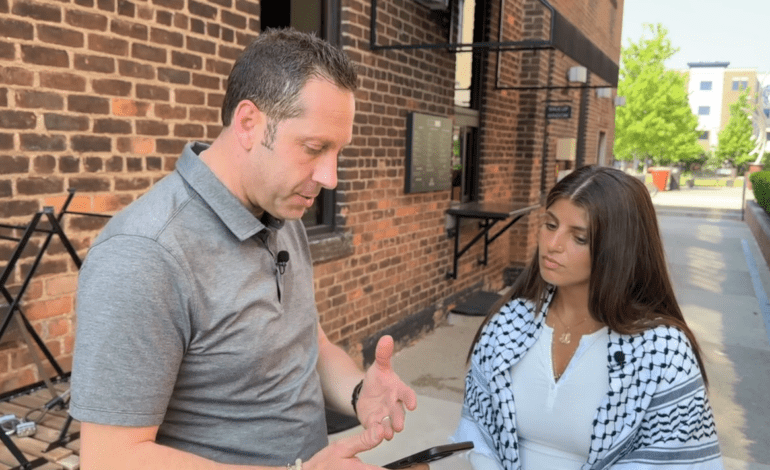DETROIT — An investigation by the Detroit Free Press revealed that the Detroit Police Department monitored dozens of pro-Palestinian protesters who participated in demonstrations against the Israeli war on Gaza last May. Detroit Police Chief James White distanced himself from these allegations, promising accountability for any violations if the surveillance is confirmed.
The Free Press obtained police documents containing names, photos, addresses and information about dozens of pro-Palestinian protesters who participated in a demonstration in downtown Detroit. The list included details about the protesters’ vehicles and their social media activities, though it did not indicate whether they had committed any violations, according to the report.
Accusations against the Detroit Police for monitoring pro-Palestinian protesters surfaced after a recorded incident during the May protest. In this incident, an officer was suspended after telling Arab American activist Lexis Zeidan, “Go back to Mexico”, knowing from her social media that she had been vacationing there just days before the protest.
The police department justified the behavior of the suspended lieutenant Brandon Cole by stating that he had seen a post from Zeidan about her trip to Mexico on her Instagram account. However, Cole was later found guilty of violating department policies and was dismissed for bias, prompting him to file a lawsuit against the Detroit Police.
In the video, after Zeidan replied that she wasn’t from Mexico, Cole responded, “you were having fun there.” This angered the Palestinian-American activist, who resides in Dearborn, leading her to accuse Cole of intimidating her.
The Detroit Free Press investigation points to the Detroit Police conducting widespread surveillance of hundreds of people participating in protests for several years, not just in May. Most of the individuals named in the lists had never committed any crimes or any legal violations.
Dan Korobkin the legal director of the ACLU of Michigan told Michigan Radio (NPR): “Law enforcement really has no business using public resources and personnel to collect information over social media — or otherwise — about people who are not reasonably suspected of serious and significant criminal activity.”
Korobkin said such behavior by police can have a chilling effect on people’s civil liberties.
“If people thought or knew in advance that the law enforcement was going to do this, they would be less likely to speak freely, travel freely, live their lives the way that everyone should be able to live,” he said.
White responded to the Free Press investigation in a statement, reiterating his previous position that the Detroit Police “do not monitor individuals who are not suspected of violating the law.” He clarified that “while department policy allows members to search for and review public social media information, no member is allowed to collect or retain information about individuals based on behavior protected under the First Amendment”, referring to the constitutional right to protest.
“As a general rule, we do not surveil anyone, especially protesters,” he added.
He further stated that if the investigation showed that Lieutenant Cole or the Mobile Field Force unit he was part of violated this policy, they would be held accountable for those violations. However, he emphasized that Cole’s dismissal was due to bias while performing police duties, not for monitoring Zeidan’s online account.
“This officer’s actions jeopardize the safety and legitimacy of more than 2,600 officers who risk their lives every day in Detroit,” White added.
In a statement to WWJ-TV, White stated that the police do not monitor people who want to protest, but “if someone goes on social media and says they will lead a convoy and block traffic or commit civil or criminal offenses, that is certainly something that would interest us.”
In contrast, two members of the Detroit Police Commission told WWJ-TV that monitoring protesters’ social media accounts is completely against department policy.
“As far as I know, nothing like this happens in Detroit,” said Detroit Police Commissioner Linda Bernard, an attorney. “The police are not allowed to intervene with citizens unless they have good reason. In the absence of that, they have no right, at least in my opinion, to monitor anyone.”
“Detroit Police officers should not monitor social media posts,”Police Commissioner Willie Burton added. “It is definitely a violation of the police department and commission’s policy.”
The adopted policy states that “the freedom to speak, dissent, write, publish and communicate privately and publicly to engage in any lawful behavior, without government interference or obstruction, is a constitutional guarantee that must be strictly respected by all police members.”






Leave a Reply